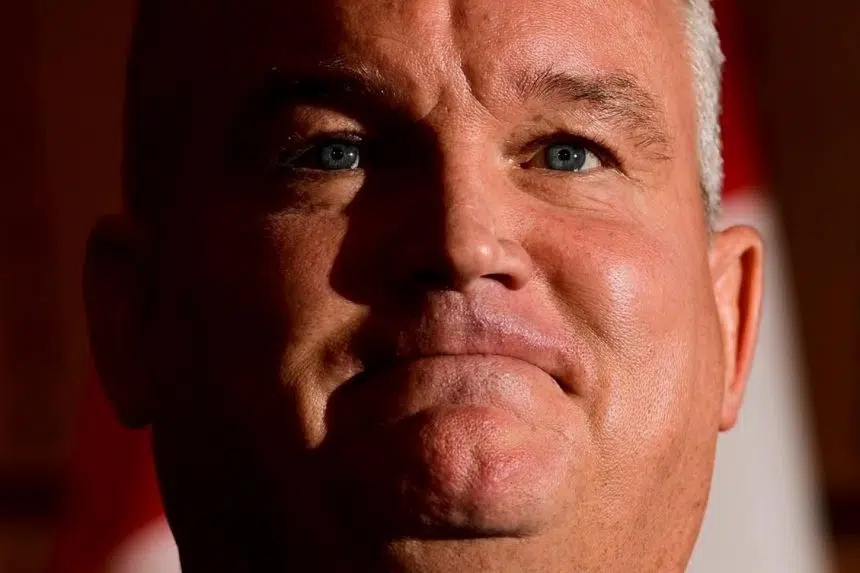OTTAWA – Newly elected Conservative Leader Erin O’Toole said Tuesday that as leader, and as a prime minister, he will stand up for the rights of women and the LGBTQ community, and he intends to apply that fighting spirit to all his files.
His comments came in his first news conference after winning the race early Monday morning, a victory owed in part to thousands of supporters of avowed social conservative candidates who backed O’Toole as their third choice, after he promised to always respect their concerns.
The Liberals in turn wasted little time accusing him of being in the pocket of that constituency, suggesting Tuesday he’s going to have to prove that’s not the case by kicking one of those candidates – Ontario MP Derek Sloan – out of caucus.
During the race, Sloan made several comments about the chief public health officer, as well as abortion, LGBTQ conversion therapy and other issues. Those comments were widely condemned as being racist and bigoted – accusations he denies.
O’Toole appeared to chalk Sloan’s rhetoric up to a heated leadership race, and said he is part of a united team.
No one should buy the Liberal spin, he said.
“I won the leadership of the Conservative party as a pro-choice Conservative MP, one that won with a strong mandate,” he said.
“That’s how I’m going to lead as the leader of the Opposition and that’s how I’ll be as prime minister. I’m in politics to defend the rights of Canadians to secure a brighter future.”
Later Tuesday, O’Toole was expected to speak with his two other challengers in the race, Leslyn Lewis and Peter MacKay.
Reaching out to them, and their supporters, is part of building his team to both guide the party in the House of Commons, but also in the next campaign.
The party will be ready for that whenever it comes, O’Toole said.
But he doesn’t necessarily intend to be the one to force an election in the confidence vote that will take place after the Liberals’ speech from the throne next month.
“I’m here to fight for the well-being of Canadians across the country and for better solutions, faster responses and excellence in government, and ethical government,” he said.
“We will assess the government going forward on all those criteria.”
O’Toole spoke with Prime Minister Justin Trudeau on Monday, a call both sides said was cordial and touched on the rigours of a campaign as well as the prorogation of Parliament.
He said he also spoke with Alberta Premier Jason Kenney, Saskatchewan Premier Scott Moe and Ontario Premier Doug Ford, and intends to meet personally with Quebec Premier Francois Legault in the coming days.
O’Toole handily won Quebec during the race, and on Tuesday, named former Quebec MP Alupa Clarke, who chaired his Quebec campaign, as a special adviser.
Fred DeLorey, who ran O’Toole’s campaign overall, has also been named the manager of the next national election campaign.
The party will also have a new executive director. The Conservative party has also decided to no longer apply for the federal wage subsidy program, a move that had been widely criticized by some grassroots members who felt it inappropriate for a political organization to be using the COVID-19 support program.
The leadership race was all about testing the preferences of the party’s grassroots and O’Toole’s task now is to read the tea leaves to figure out the path forward.
Meanwhile, a strong signal was also sent by those who backed Lewis.
Lewis entered the campaign a relative unknown, but her efforts gained enough traction to see her finish with a strong third-place showing.
Her campaign had been launched with the backing of established social conservative groups, but party insiders across the campaigns say her support broadened at several key moments in the race.
One of them was a decision by MacKay to attack O’Toole’s position on carbon taxes and a reversal on a pledge to end fossil fuel subsidies that saw more people pivot to her and away from O’Toole.
Before she dropped off the ballot, Lewis won the vote in Manitoba, Saskatchewan, Alberta and B.C.
One element that also helped propel Lewis forward was the fact she was clear on her social conservative views, and action she would take if she won.
Former leader Andrew Scheer had faltered on that score on the campaign trail and it cost the party in the last federal election.
When asked Tuesday how else he’d be different from Scheer, O’Toole was blunt.
“I have a track record of serving Canada and getting things done,” he said. “That’s why I’m not famous, I’m not well known. I get things done, I don’t drop the ball.”
Stephanie Levitz, The Canadian Press







